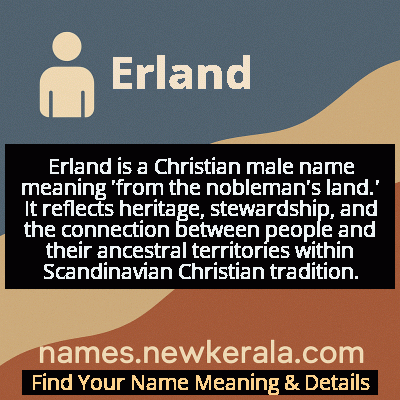Erland Name Meaning & Details
Origin, Popularity, Numerology Analysis & Name Meaning of Erland
Discover the origin, meaning, and cultural significance of the name ERLAND. Delve into its historical roots and explore the lasting impact it has had on communities and traditions.
Name
Erland
Gender
Male
Origin
Christian
Lucky Number
9
Meaning of the Name - Erland
Erland is a Christian male name meaning 'from the nobleman's land.' It reflects heritage, stewardship, and the connection between people and their ancestral territories within Scandinavian Christian tradition.
Erland - Complete Numerology Analysis
Your Numerology Number
Based on Pythagorean Numerology System
Ruling Planet
Mars
Positive Nature
Generous, passionate, energetic, and humanitarian.
Negative Traits
Impulsive, impatient, moody, and can be overly emotional.
Lucky Colours
Red, maroon, scarlet.
Lucky Days
Tuesday.
Lucky Stones
Red coral, garnet.
Harmony Numbers
1, 2, 3, 6.
Best Suited Professions
Military, sports, philanthropy, leadership roles.
What People Like About You
Courage, energy, leadership, generosity.
Famous People Named Erland
Erland Josephson
Actor and Director
Starred in numerous Ingmar Bergman films and was a leading figure in Swedish cinema
Erland von Koch
Composer
Created significant Nordic-inspired classical works including 'Nordic Caprice'
Erland Kops
Badminton Player
Won 7 All England Open titles and dominated international badminton in the 1960s
Saint Erland
Religious Figure
13th century Orcadian saint and martyr venerated in Norse Christian traditions
Name Variations & International Equivalents
Click on blue names to explore their detailed meanings. Gray names with will be available soon.
Cultural & Historical Significance
Extended Personality Analysis
People named Erland are typically characterized by their strong connection to tradition, reliability, and grounded nature. They often exhibit a quiet confidence and inner strength that doesn't require external validation, reflecting the name's association with noble stewardship of land and heritage. Erlands tend to be patient, methodical thinkers who approach challenges with practical wisdom rather than impulsive reactions. Their personality often combines introspection with a deep sense of loyalty to family and community, making them dependable friends and partners. The name suggests someone who values stability and creates strong foundations in all aspects of life, while maintaining a respectful connection to their cultural roots and traditions. This combination of traits makes Erlands often perceived as wise beyond their years, with a calming presence that others find reassuring and trustworthy.
Modern Usage & Popularity
In modern times, Erland maintains a consistent presence in Scandinavian countries, particularly Sweden and Norway, where it's considered a traditional yet distinctive choice. While not among the most popular names, it has experienced a mild resurgence as part of the broader revival of historical Nordic names. The name appeals to parents seeking connections to Scandinavian heritage without choosing overly common options. Internationally, Erland remains quite rare but is occasionally used by families with Norse ancestry or those attracted to its strong cultural roots and meaningful background. Its usage patterns reflect a balance between honoring tradition and selecting a name that stands out for its historical depth and cultural significance in an increasingly globalized world.
Symbolic & Spiritual Meanings
Symbolically, Erland represents the profound connection between people and their ancestral lands, embodying concepts of stewardship, heritage preservation, and cultural continuity. The name carries metaphorical meanings of being rooted in noble traditions while adapting to changing circumstances, much like the Scandinavian cultures that embraced Christianity while maintaining their Norse identity. It symbolizes the bridge between ancient and modern, pagan and Christian, individual and community. The land element suggests stability, growth, and responsibility, while the noble connotation implies dignity earned through faithful service rather than inherited privilege. This combination makes Erland a powerful symbolic name representing the integration of personal identity with cultural legacy and the sacred responsibility of preserving what matters most across generations.

